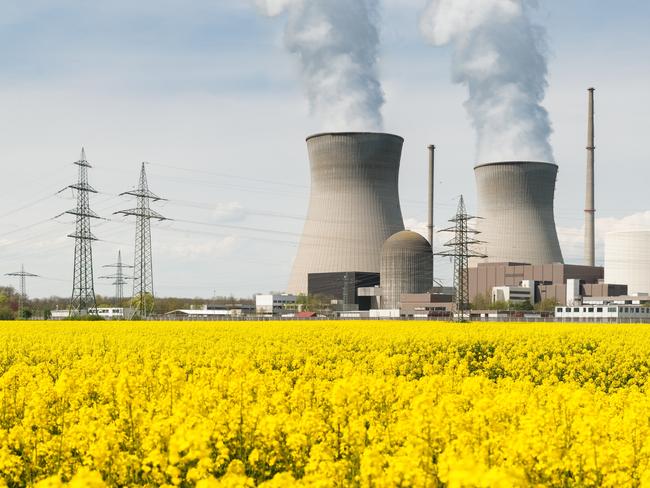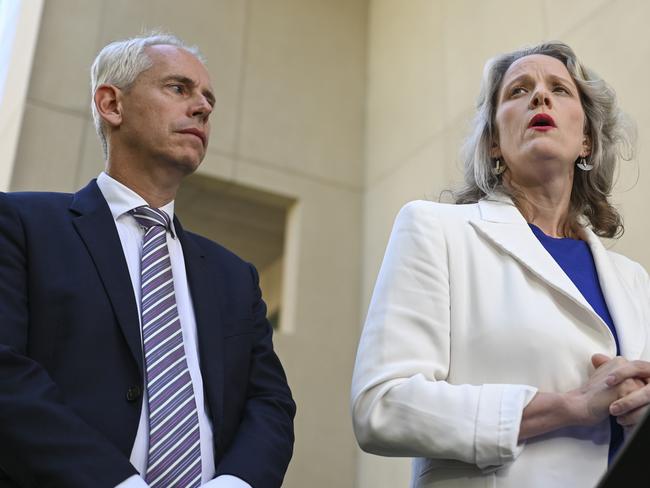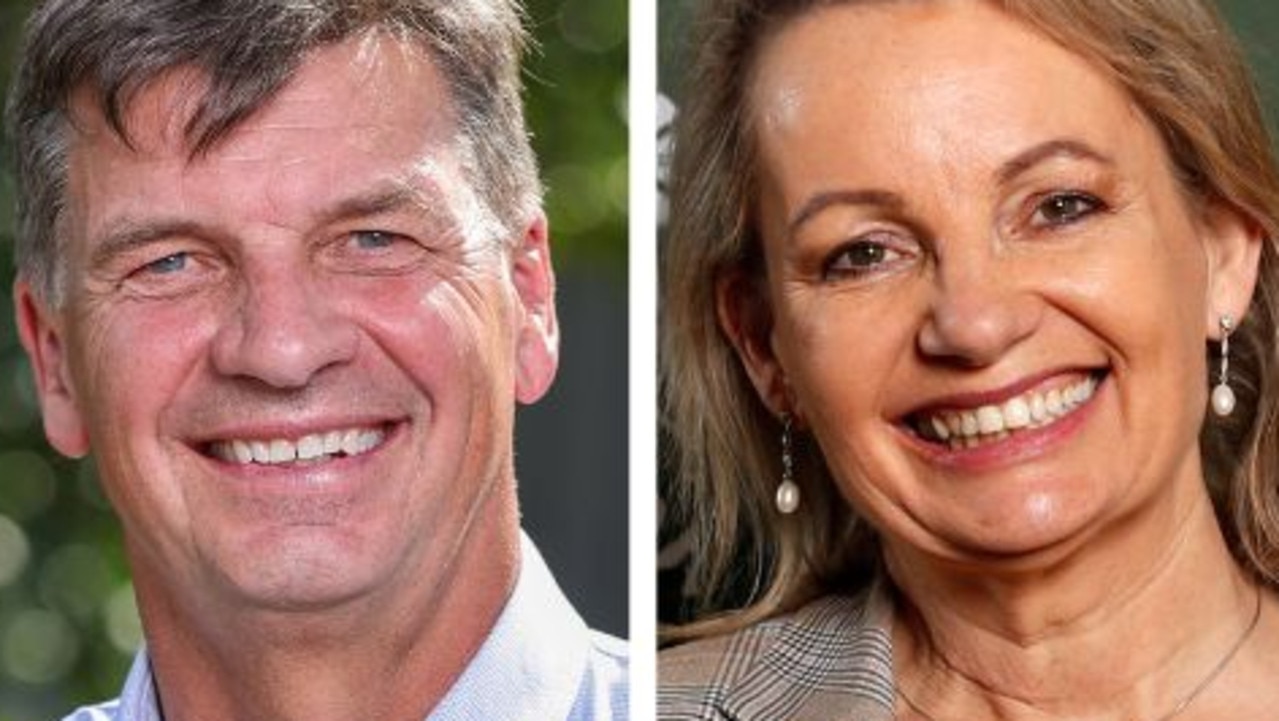Peta Credlin: Nuclear is the only way Australia will hit net zero and remain a first world economy
There’s no good reason why we should be closing down coal-fired power, but if we really do have to get to net zero it’s game, set and match to nuclear energy, writes Peta Credlin.

Opinion
Don't miss out on the headlines from Opinion. Followed categories will be added to My News.
For a country that normally prides itself on being “can do”, why is there such a “can’t do” aversion to using nuclear power on land, especially from a federal government that says it’s in favour of using nuclear power at sea?
This monumental hypocrisy was on full display in parliamentary question time this week, with Defence Minister Richard Marles talking UP nuclear power, and Energy Minister Chris Bowen talking DOWN nuclear power in successive answers.
Meanwhile, in a series of media appearances last week, the Energy Minister in the Canadian province of Ontario, Todd Smith, systematically refuted all the arguments typically used against nuclear power here.
As with more than 30 other countries, Canada uses civil nuclear power to generate emissions-free 24/7 electricity. Most of its nuclear reactors are in Ontario, a province of 15 million people, with a main city Toronto, about the size of Sydney or Melbourne, generating about 60 per cent of its power supply from nuclear reactors. Ontario faces the same issue that we do: how can you reduce emissions while keeping the lights on.
Initially, Ontario looked to renewable power, but is now building more nuclear reactors because they’re clean, relatively affordable, and reliable.

When challenged about the cost comparison between nuclear and renewables, Smith pointed out that, when all the costs of renewables were taken into account, such as extra transmission lines and “firming” (back-up energy for when the sun isn’t shining and the wind isn’t blowing), renewables – at 60c to 80c a kilowatt hour – were almost 10 times the cost of nuclear, which is about eight to 10c a kW hour.
Challenged about the time taken to build nuclear plants, Smith pointed to the most recent plant, being built not far from Toronto – involving four individual 300 megawatt small modular reactors – that was started in 2022 and is expected to be operational in 2028. Smith also made the obvious point that wind and solar power was only there for 25-35 per cent of the time, yet the modern world requires electricity 24/7. And as for the supposed difficulty of establishing a regulatory regime for nuclear power, Smith observed that countries such as Poland are more or less just copying the rules from Canada that has never had a significant nuclear accident.
To me, there’s no good reason why we should be closing down coal-fired power and failing to develop gas-fired power just because of CO2 emissions, given that our emissions are scarcely one per cent of the world’s total; we’re still prepared to export coal and major competitors such as China are opening new coal-fired power stations almost weekly. But if we really do have to get to net zero, plus remain a first world economy, there’s only one way to do it and that’s via nuclear power.
At 15 cents a kW hour, Ontario doesn’t have the cheapest electricity in Canada, but it’s still a lot more affordable than both NSW and Victoria, where the average price is 34c and 29c as kW hour respectively. I reckon that makes it game, set, and match to nuclear. And given that our Energy Minister is the guy who lost control of our borders when immigration minister, then helped to lose Bill Shorten the 2016 election as shadow treasurer, if Todd Smith wants to challenge Chris Bowen for his job, that should be a lay down misere as well.
WATCH HOW LABOR TRIES TO SPEND ITS WAY OUT OF TROUBLE
On the foreign criminals now free in our community, the Albanese government is not just incompetent but increasingly dishonest too. Last Tuesday, the government tried to ambush the opposition with a proposed new law to lock up criminals who couldn’t be deported, demanding that the Coalition pass this new law through the parliament before the Easter recess. And when the Senate, understandably enough, referred it to an inquiry, ministers hyperventilated that Peter Dutton was “playing politics” with public safety. Home Affairs Minister Clare O’Neil even accused Dutton of having driven immigration policy “into a ditch”.
Talk about pots and kettles. It subsequently emerged that drafting instructions for the proposed new laws had been given to officials months ago, that the legislation had been printed four days earlier, and that it was not – as initially claimed – necessary to deal with pending High Court decisions.
The whole exercise was a stunt designed to wedge Dutton, forcing him either to back a government with a bad record or to look weak on border security.

On matters of national security, the Abbott government was always careful to try to preserve bipartisanship. On military deployments or changes to national security laws, as chief of staff to the PM, I was often talking to the then-opposition leader’s office. There was never any question of trying to steam-roller the other side before it had time for due process. To his credit, Bill Shorten was always upfront about his position and candid about what Labor would and wouldn’t support.
One of the oldest political tricks in the book, when you’re in deep trouble, is to blame it all on the other side. The problem for Labor is that no one thinks it has a defensible record on border security. We only have tens of thousands of failed asylum seekers here because the Rudd-Gillard government abandoned the Howard-era border protection policies it had largely promised to keep; thereby restarting the people smuggling trade responsible for 50,000 illegal arrivals by boat and over 1000 deaths at sea. And we only have 150-plus foreign criminals loose on our streets, and very likely more to come, because the Albanese government was slow to anticipate and adequately prepare for well-telegraphed High Court decisions.
It’s a sign of a government that’s more and more accident-prone that it’s now trying to fit-up Dutton as a border protection weakling. This is the same person who, when border protection minister, Labor was constantly demonising as brutal and heartless. The idea that the party that, in government, successfully stopped the boats is somehow weaker on borders than the party responsible for starting them up is simply laughable.
But these are the increasingly desperate tactics born of fear that it might be a one-term government. Even woke big business is now at odds with Labor over its pro-union industrial policy. The government’s failure to rein in legal migration is exacerbating the housing crisis. Voters unhappy about cost-of-living pressures are unlikely to forgive Labor’s broken promise to cut power bills by $275 a household a year. And with four quarters now of falling GDP per capita, the national mood is understandably sour. Then there’s the Prime Minister’s failed Voice obsession and the appearance Anthony Albanese sometimes gives of being more interested in attending celebrity events than governing.
It’s no wonder the Resolve poll had the PM’s personal approval rating fall five points in a month. Despondent Labor MPs left this week hoping for a budget reset. With another accidental surplus tipped, watch Labor try to spend its way out of trouble.
More Coverage
Originally published as Peta Credlin: Nuclear is the only way Australia will hit net zero and remain a first world economy





